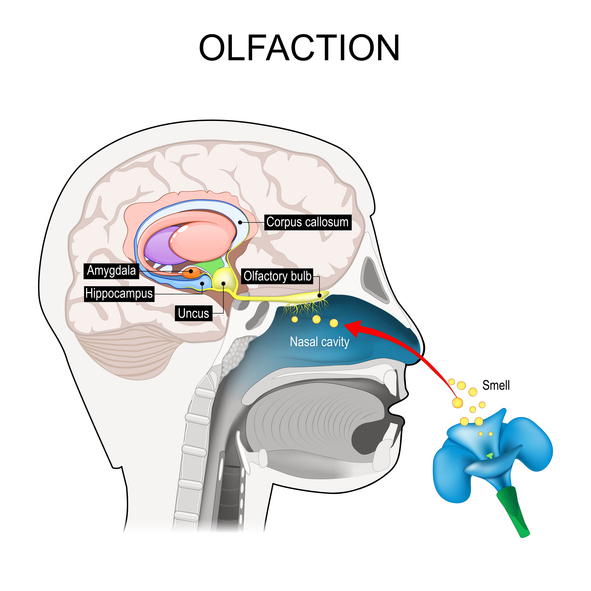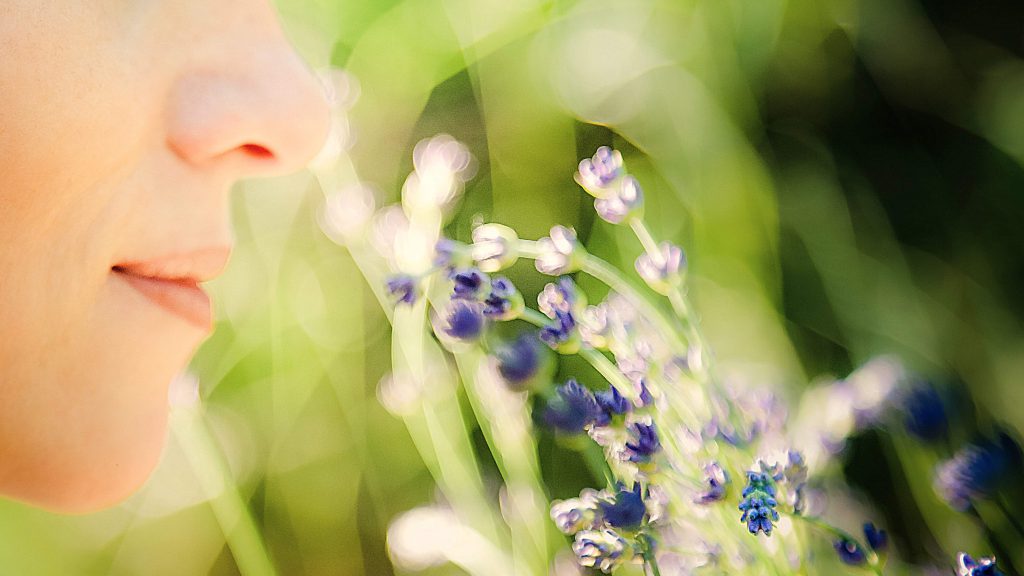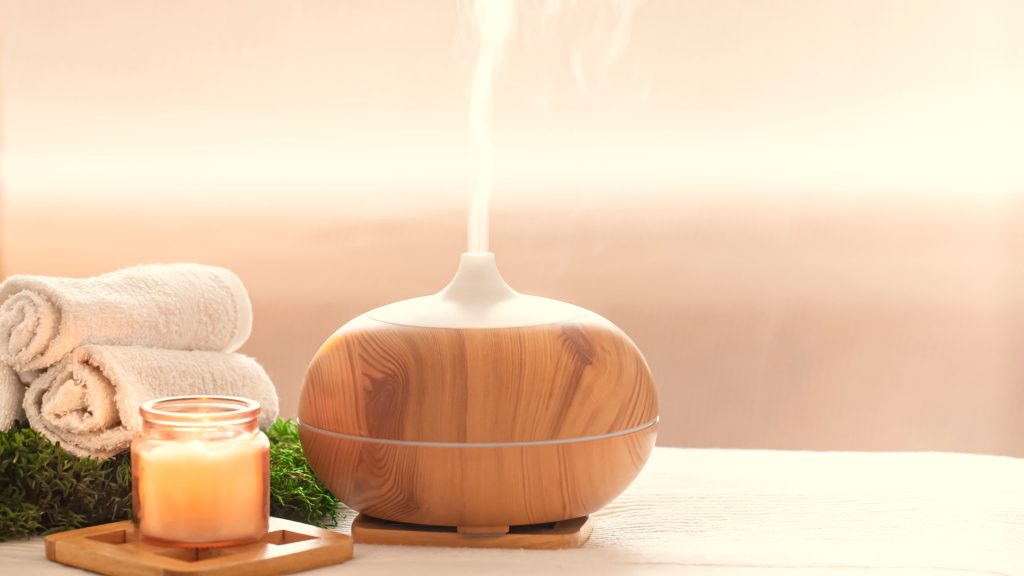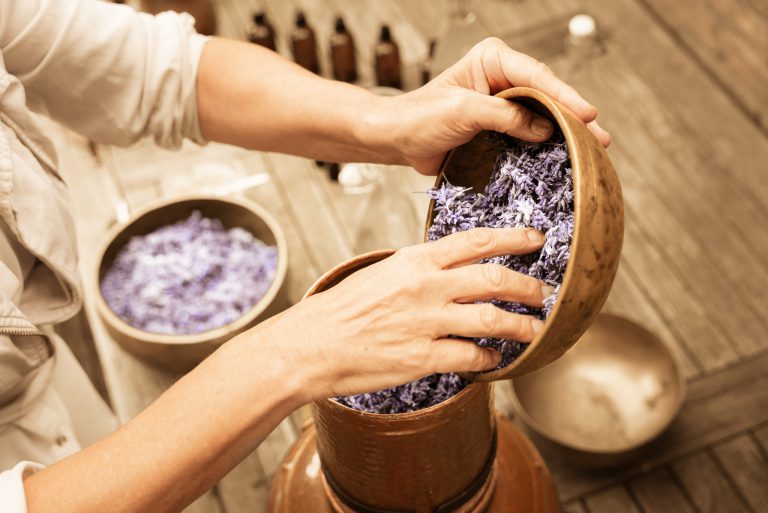
Have you ever experienced that a scent suddenly took you back to a fond memory or instantly changed your mood? This is because scents directly reach our brain, particularly the area that regulates emotions and memories. Olfactory psychology studies this intriguing influence on our mood, emotions, behavior and memories. It also examines how and why this happens and what this might mean for you.
For more than thirty years I have been fascinated by olfactory psychology, a passion that began during my studies to become an Aromatherapist. My years of practical experience have shown me time and again how powerful scents, or essential oils, can be in influencing your state of mind. To further refine my expertise, I have attended numerous workshops and seminars. I closely follow ongoing developments in the field of olfactory psychology because the impact of scent goes much deeper than we often realize.
In this article, I take you into the world of olfactory psychology. Discover what scents do in your brain, learn more about the power of essential oils and be inspired how you could use olfactory psychology.
Why scents have such a powerful effect
Every time you smell a scent, something special happens in your brain. Odor molecules bind to receptors in your nasal mucosa and send signals through the olfactory nerve to the olfactory bulb. This part of your brain plays a crucial role in recognizing and processing odors. What makes this process so unique is its direct connection to the limbic system, the primordial part of your brain involved in emotions, motivation and memory. This allows scents to trigger a memory or feeling at lightning speed, often before you are even aware of the scent.

The limbic system includes the amygdala, which is responsible for processing emotions, and the hippocampus, which plays a key role in storing memories. This explains why a specific scent can trigger a strong memory from your childhood and trigger an emotional response at the same time.
So, every time you perceive a scent, your brain triggers a complex network of activities that is closely linked to your emotions and memories. This is the power of smell that thereby demonstrates its ability to influence your mood, your mental state of mind.
Scientific insights; the influence of scents on your life
Research on the influence of scents on behavior, emotions, and memories has yielded fascinating insights. Scientists use a variety of methodologies. They use laboratory experiments. In these, participants are exposed to different odors while their physiological responses are measured, such as changes in heart rate, skin conductance, and brain activity. In addition, questionnaires are often used to capture subjective emotions and memories.
In MRI studies, they can even see which parts of the brain become active when a person smells a scent. Studies like this have confirmed that scentprocessing follows a unique pathway that leads directly to the emotional and memory-related areas of the brain.
All of these discoveries from scent research confirm that scents have a profound effect on how you feel, what you remember and how you behave. Whether it's a scent that instantly takes you back to your childhood or one that helps you relax after a long day. The power of scent is impressive. Just look at the examples of the studies below and their results.
Memories and scent (Proust effect): A classic study in the 1990s by Rachel Herz and co-authors showed that scents evoke more powerful and vivid memories than other sensory stimuli such as images or sounds. This phenomenon is known as the “Proust Effect,” named after French writer Marcel Proust, who wrote about how a specific scent can trigger a flood of old memories.
Scent and emotions: a study published in the Journal of Neuroscience in 2017 examined how scents affect emotional processing in the brain. The researchers found that the amygdala, the brain region that processes emotions, is directly activated by olfactory stimuli, which explains why scents can evoke strong emotional responses.
Scents and stress reduction: Reseach published in the International Journal of Neuroscience in 2002 found that lavender scent can alter brainwave activity, leading to a reduction in stress and anxiety. In this study, the effects of lavender oil were compared with those of a placebo, with the lavender oil showing significant calming effects.
Scent and taste perception: Studies have shown that smell plays a crucial role in the perception of taste. A study in Chemical Senses from 2010 found that blocking the sense of smell (for example, due to a cold) significantly reduces taste perception. This research highlights the strong connection between smell and taste experiences.
Scents and cognitive functions: A study in Psychoneuroendocrinology from 2013 examined the effect of rosemary oil on cognitive performance. The results showed that the scent of rosemary can improve concentration and memory. Participants exposed to rosemary oil performed better on memory tests than the control group.
Scents and sleep quality: Research published in Sleep in 2005 examined the effects of lavender scent on sleep quality. It found that exposure to lavender before bedtime improved sleep quality and regulated the sleep cycle, especially in people with sleep problems.
Scent and social interactions: A study published Nature Communications in 2015 examined how scent subconsciously influences social interactions. The researchers found that human odorants, such as pheromones, can contribute to attraction and communication between individuals.

The power of scent; olfactory psychology and essential oils
Essential oils are much more than pleasant scents; they actually contain powerful, natural compounds that can cause biochemical reactions in your body once inhaled or absorbed through the skin. In addition to improving your mood, these oils can also support your physical health, such as relieving headaches and promoting a good night's sleep.
The power of essential oils lies in their direct interaction with your brain through olfactory psychology. When you inhale an essential oil, the scent molecules reach the limbic system-the part of your brain that controls emotions, memories and your autonomic nervous system. This process happens unconsciously and at breakneck speed, which explains the profound impact of scents. The purer and more natural the essential oil, the more powerful the effect.
For therapeutic applications, it is crucial to use only pure and pristine essential oils, or carefully formulated aroma blends. This is because these will give you the most effective resultsUse essential oils and boost your mood.
Why quality essential oils matter
To harness the full power of fragrance, it is essential that you use high-quality essential oils. Not all essential oils are created equal. Many oils contain synthetic additives, are diluted with other substances or are produced in a way that reduces their effectiveness. When you choose cheaper, less pure oils, you run the risk of not experiencing the desired benefits, and in some cases, they may even be harmful.
High quality essential oils are produced purely and naturally, (distilled, extracted or cold pressed) without chemical additives. They often come from organic or wild-picked plants, which means they are both effective and also safer for your health. When you invest in quality oils, you are sure to get the full therapeutic benefits.
Use essential oils and boost your mood

Whether you are looking to relax, boost your energy levels, or improve your mood, pure essential oils allow you to make the most of the power of scent. It is fragrance as Mother Nature intended, in its most powerful and pure form.
Practical tips for using essential oils
Want to experience the power of essential oils for yourself? Here are some tips:
- For relaxing: use lavender, pine or Chamomilla
- for alertness: Peppermint is ideal for meetings or while driving the car.
- For a boost : Rosemary helps you get going in the morning, while pepper warms and energizes.
- For joy: Then use citrus oils such as mandarin, orange or bergamot provide an upbeat atmosphere.
Olfactory psychology in your practice or business
If you want more experience in olfactory psychology or want to apply it professionally, here are the following possibilities
For hypnotherapists is an HBO accredited specialization in which you learn to professionally use olfactory psychology with essential oils during your hypnotherapy sessions. Click be for more information
For all healthcare specials regular or complementary there is the HBO accredited specialization Essence of Wellbeing Chakra balancing. This specialization combines the universal human needs-as described in Maslow's famous pyramid-with the ancient wisdom of energy systems. Discover how olfactory psychology and essential oils can support our well-being. Click be for more information
Are you curious how to use scent psychology for your business or product? Contact me for a free introduction meeting.. Together we will discover the possibilities of taking your brand to the next level with scent.
Scent Experiences can be a powerful tool to strengthen your brand, whether you have a wellness center, practice space, or product line. You can do this as early as one unique aroma blend that perfectly matches your brand to inspire your customers and leave a lasting impression. Or invite me for a workshop or presentation especially for your clients or employees and let me take you into the world of fragrances from Mother Nature. Click be voor inspiratie.

Smelling, remembering and reacting, all in one breath. Unconsciously, we are immersed in all kinds of scents throughout the day with every breath, and surely that is about 15,000 times a day. So many moments to give yourself and others a wonderful olfactory experience. An experience with pure fragrances, also known as essential oils, is truly a wellness for body, mind and spirit, and that is what I grant you.”
With love, Joanne





